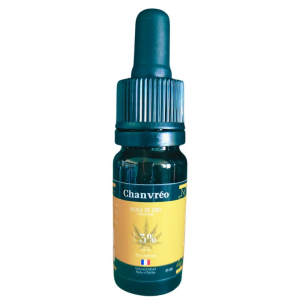Is CBD safe for cats?
Absolutely, and your vet will tell you. CBD is very well tolerated by our feline friends for one simple reason: their endocannabinoid system is similar to that of humans. Having said that, keep in mind that:
- As in humans, too high a CBD dosage can produce some mild and temporary side effects in cats (we let's talk below). The intensity of side effects is usually higher in cats that have not had time to learn the effects of cannabidiol and cannabinoids like CBG and CBN (in the case of a broad spectrum CBD oil or full spectrum);
- Only CBD products without THC (near-zero level) are tolerated by cats and, more broadly, pets. company. All the CBD products for cats, dogs and humans that you will find in our online store have an almost zero THC level, in accordance with the legislation in force. You can therefore make your choice with complete peace of mind, without fearing for your cat's health;
- Because each cat is unique, it is impossible to predict the receptivity and sensitivity of its endocannabinoid system to the ingestion of CBD products ;
- Discuss the health benefits of CBD products for your cat with your veterinarian. Indeed, only he can recommend (or not) the use of CBD oils, cannabidiol mash, CBG treats or even CBD salmon to relieve chronic pain, regulate appetite, reduce stress. and anxiety or as part of the treatment of sleep disorders in your cat. More broadly, seek the advice of your veterinarian on the benefits of CBD from the hemp plant type Cannabis L. Sativa or Cannabis Indica to improve the quality of life of your cat on a daily basis.
What are the benefits of CBD for cats?
Cannabidiol is full of virtues and benefits, whether for humans or animals. This non-psychotropic and non-addictive molecule extracted from the hemp plant (Cannabis L. Sativa or Cannabis Indica) has pain-relieving, anti-inflammatory and soothing properties. Here are the expected benefits for your cat:
- Promote healthy bone and cartilage function to maintain animal mobility;
- Temporarily soothe stomach pain;
- Support brain function;
- Reduce stress and anxiety levels and promote emotional balance in the cat;
- Relieve inflammation;
- Promote healthy, restful sleep, especially in restless cats;
- Strengthen the immune defenses of the cat.
CBD products for cats: what about side effects?
As explained above, side effects most often appear when the dosage is too high, especially in a cat (or any other pet) whose endocannabinoid system has not had time to gradually initiate itself to the benefits of CBD. Typically, these side effects are mild and temporary. However, stay alert and look for the following effects:
- Vomiting;
- Fatigue, asthenia, or lethargy;
- Lack of appetite;
- Diarrhea.
Accidental ingestion of excessive amounts of CBD products can produce ataxia in cats and other pets, with muscle weakness and impaired movement coordination. However, there is talk of a dosage several hundred times higher than the usual dosage and which would cause serious side effects in humans as well.
As a reminder, here are the signs that a cat is not healthy, for one reason or another:
- A social cat that begins to hide;
- A cat that curls up on itself for long hours;
- A cat that no longer grooms itself, or spends all day grooming to the point of injury;
- A cat that meows unusually or excessively;
- Vomiting and/or diarrhea;
- A cat that becomes excessively restless, a sign of anxiety or environmental stress;
- A cat that refuses to use its litter box.
How much CBD product for a cat?
Here again, we advise you to seek the advice of your veterinarian. His knowledge of your cat's state of health, the medications he is taking and his weight will allow him to guide you on the dosage and method of use of the CBD product for cats. However, here are some generic dosage recommendations to give you an idea:
- For health conditions such as asthma or arthritis, a dosage of 0.5 mg/kg is generally recommended twice a day. For a 4 kg cat: 2 mg of CBD twice a day, equivalent to one drop of 5% CBD oil per serving.
- For inflammatory bowel disease, a dose of 0.5 mg/kg once daily is recommended. For a 4 kg cat: 2 mg of CBD once a day, equivalent to one drop of 5% CBD oil per day.
- In case of upper respiratory tract infection: A dosage of 5 mg/kg twice daily is generally recommended. For a 4 kg cat: 20 mg of CBD twice a day, equivalent to four drops of 10% CBD oil per dose. Warning: This dosage is high. It must be monitored by a veterinarian.
How to administer CBD to your cat?
Of all pets, the cat is probably the one who lets it go the least, especially when it comes to making it ingest products that come out of its usual diet, especially if the latter consists of treats with salmon or chicken mash! Here are some suggestions for gradually integrating CBD products into your cat's diet without suffering the claws of your tomcat:
- If your cat is food-averse (lucky you!), opt for a full-spectrum CBD oil that also contains CBG and CBN. Indeed, terpenes are beneficial and enhance the effects of the product;
- If your cat is more picky about their food, opt for a neutral CBD oil instead, as full-spectrum oils have a strong hemp flavor which may repel the animal;
- Regardless of the CBD product you choose, we recommend that you do the following: Using an account- drops, pour the desired number of drops into your cat's favorite food (pâté, treats, salmon croquettes, etc.). Make sure to place the drops on the upper part of the food so that they do not filter towards the base of the bowl.
- Alternative: You can also opt for a CBD oil for cats that is applied topically to "bare" skin of the cat, especially inside the ear. You can also dab CBD oil on the paws for the cat to lick off… but this method of use is more random.
Is CBD for cats legal in France?
As with all CBD, CBG and CBN products, CBD products for cats and dogs (oil, mash, lozenges, salmon, treats, etc.) are governed by European decree n°639 – 2014. CBD products for cats and dogs can be marketed freely in France, provided they display an almost zero THC level, less than 0.3%, guaranteeing the absence of any psychotropic or "high" effect.
All CBD products for humans and pets (cat and dog) contain virtually no THC, in accordance with current regulations. This provision also applies to full or broad spectrum CBD oils that contain other cannabinoids such as CBG and CBN.









